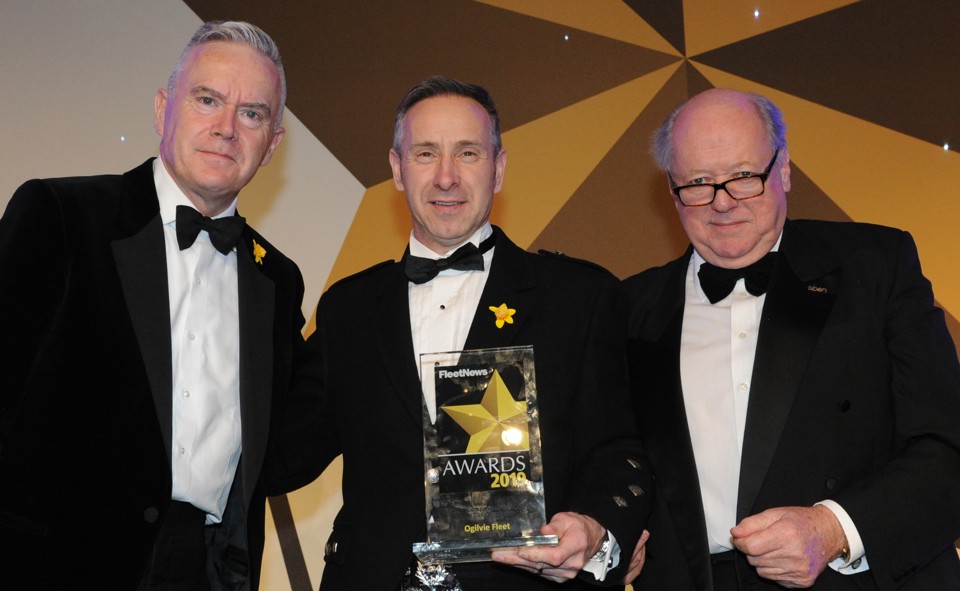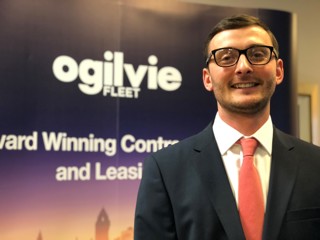Ogilvie Fleet is a leasing company that refuses to stand still. With a brace of awards and recognition from across the industry, the company’s dedication to its customers has enabled it to continue growing – despite a turbulent market.
“So many times we’ve seen smaller lease companies grow into larger ones and then lose touch with the ideals and principles that helped them grow in the first place,” said Nick Hardy, Ogilvie Fleet sales and marketing director.
“We never wanted that to be the case with us and we have been keeping a very careful watch on our ongoing CSI and Best Company scores to ensure our clients are happy with what we do and, crucially, that our staff are happy and can therefore provide the best customer service at all times.
“Priority one is our amazing team. They are the people that deliver all the good things that we do and without them we would be nothing.”
Continual investment in products, such as its Happy Drivers app and APPraisal, has helped fleet managers and drivers overcome end-of-contract damage charges, in a bid to avoid having a pleasurable leasing experience “tainted”.
We spoke to Hardy about Ogilvie’s method:
Fleet News: How do you ensure you maintain a high level of customer service as your fleet and customer base grows?
Nick Hardy: By working really hard at it, relentlessly. There is no easy way to deliver great customer service and keep ahead of the competition. It takes hard work, dedication and flexibility. Staying number one in our industry for customer service is totally inherent to all we do.
At our management and board meetings each month, we spend time reviewing our customer service and net promoter scores to ensure our own high expectations are being met. I think if further growth meant having to sacrifice on our principle of being the best service provider in the industry, we would have to think long and hard about what we are really trying to achieve.
We believe we have the right mix of people, technology and ownership to continue to grow and stay number one in our sector.
FN: Have you seen a decline in the ‘traditional’ company car?
NH: The answer to that has to be “yes”, but at the same time we have had yet another year of substantial growth and thus, while there does seem to be a move away from company cars in some zones, it hasn’t actually adversely affected us. The reality is that the company car still offers fantastic and relatively risk-free motoring for most company car drivers and while BIK rates have – wrongly, in our opinion – increased, a sensible choice of car and operation will still see the company car as the best available option.
We are seeing a huge uptake in EVs and PHEVs now, which offer real cost-saving opportunities for many company car drivers. For us, the important element is that we can provide the solution for our clients one way or another. That is why we have developed our PCH offering and are investing in an easy-to-operate SECO (simple employee car ownership) scheme.
Increasingly, no one method of operation suits all drivers in a fleet and our simple plan is to continue to take the headaches away from fleet managers, while keeping drivers in the right vehicles for their role and lifestyle. That can easily be achieved without losing company car drivers.
FN: What do you predict the future of the leasing sector will look like?
NH: I think we are fast moving towards the need to be mobility solutions providers rather than traditional “contract hire companies”. The industry has been morphing this way for a few years now and we saw it coming a long time ago. Investing in our online solutions and new products in recent years has allowed us to keep pace so far and we intend to continue to develop our product range in the future.
We have to become more agile and fluid in the way that we work; we will have to look at how we can provide easier-to-access short-term mobility and we will have to use data in a way we don’t currently do, to really offer the right, on-demand, mobility solutions. Exciting times ahead!
FN: Do you predict EV supply will continue to be an issue next year?
NH: The demand for EV and PHEV vehicles is clearly only going to increase and we suspect that supply will still be challenging in the short term. Supply of almost all vehicles has been an issue in recent months – even years now – and it’s relatively normal to be waiting 12-16 weeks for a car of a particular spec.
Next year will be pivotal in terms of our changing vehicle landscape. This is a huge learning curve for manufacturers, leasing companies, dealers, clients, drivers, EV charge point fitters and, indeed, everyone in the supply process.
Change of this magnitude doesn’t happen overnight and I am impressed with the way many of us have already handled the degree of change in the past few months. We thrive on challenges, they help keep us on our toes and at the top of our game. Anything else would be boring and we certainly don’t do boring or standing still at Ogilvie.
FN: Following the launch of APPraisal, are there any other new initiatives you are working on or looking to introduce?
NH: We have been further developing our app, which now has links to orders, taxation and delivery updates on it as well as full information on a driver’s current vehicle. We intend to enhance that on an ongoing basis so it becomes a driver’s first port of call for anything relating to their Ogilvie vehicle. We’ve also been working hard on developing our EV knowledge base, which is soon to go fully online and will help fleet managers and their drivers through the maze that is EV. Lastly, for now, we are also working on the finishing touches to our SECO product, that will demystify much of the complicated past of employee car ownership schemes. That will launch early in 2020 and will provide both client and their drivers a possible way to reduce their operating costs and benefit-in-kind. It isn’t for everyone, but if a driver is in the right target zone with mileage, car preference and tax rate, it can be a substantial all round win.
Ogilvie reacted to WLTP by providing a constant stream of digital information to customers, alongside client-facing staff who have been fully trained on new legislation and its effects.
“It is a minefield for us to navigate ourselves and we know what we are doing!” said Hardy. “We just ensure we understand what is happening and then, through communications and face-to-face meetings, help clients with these changes and refine their policies to take account of them.”
Ogilvie Fleet ran a series of workshops for its clients around this subject and linking it with an introduction to EVs. It also introduced initiatives to help clients make informed decisions, such as contract flexibility, short-term rental discounts and client seminars with industry experts.
Its reactive and positive approach to change also led to a number of clients placing orders before the plug-in grant deadline, thanks to a campaign outlining changes.
Judges’ comments
Ogilvie Fleet is strong all round and has achieved good business growth in a challenging market. The judges praised Ogilvie’s use of technology, electric vehicle proposition and support for customers on key issues such as WLTP. Strong testimonials and satisfaction measures demonstrate that Ogilvie is as passionate as ever about customer service.




















Login to comment
Comments
No comments have been made yet.